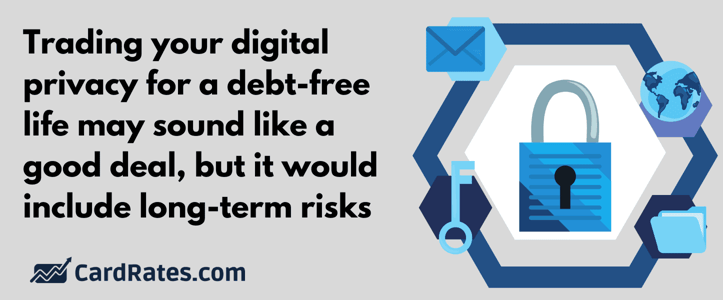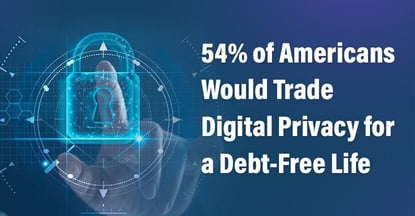In an era where Americans face unprecedented credit card debt of $1.13 trillion, the cycle of debt repayment — often confined to interest alone — has become a relentless burden for many. This has cast a shadow over their financial freedom.
Moreover, there are less scrupulous entities that operate online that exploit consumers’ vulnerabilities. These companies, such as same-day loan providers and predatory lenders, lure consumers with alluring yet potentially misleading promotions, often characterized by excessively high interest rates and aggressive lending practices. But what if the escape from this debt was as digital as its origin?
We conducted a survey of 3,000 indebted consumers, posing a hypothetical question:
Would you trade your lifetime’s internet browsing history data for the elimination of your current credit card debt?
The survey revealed the lengths to which people would go to regain their financial autonomy, with over half (54%) willing to surrender their lifetime browsing data in exchange for instant debt relief.
Trading Digital Privacy is Risky
At first glance, this may seem like an easy deal to accept — after all, very few people monetize their internet data, and the average credit card debt in the U.S. stands at $6,295.
But trading one’s digital footprint for financial freedom comes with significant risks and long-term consequences. A person’s internet browsing history is a treasure trove of personal information, revealing their interests, habits, and even their most intimate thoughts.

By handing over this data, consumers expose themselves to potential privacy breaches, targeted advertising, and even identity theft. Moreover, as technology advances and data becomes increasingly valuable, the long-term cost of surrendering your digital footprint may far outweigh the short-term relief of debt elimination.
The idea of trading personal data for financial gain sets a dangerous precedent. In a world where data is already being misused and manipulated, do consumers really want to open the floodgates by exchanging their personal information for short-term financial gain?
Colorado and Louisiana Respondents Were Most Willing to Make the Trade
When broken down by state, the survey showed that Coloradans and Louisianans would be the keenest on clearing their debts in exchange for data. Over two-thirds (68%) of respondents in each of those states said they would make this trade.
Respondents who said they were least willing to trade their digital freedom were from New Hampshire — the state whose official motto is ‘Live Free or Die’. Only 1 in 5 respondents there said they would give up their lifetime digital footprint for a credit debt-free year.
An infographic showing the survey results in each state:
Created by CardRates • View larger version
To further understand people’s decisions when it comes to credit card debt, CardRates.com posed another hypothetical question: Would consumers be willing to have no contact with friends or family for a year if it meant their credit card debt would be canceled? Surprisingly, 1 in 3 respondents said they would accept this offer.
Participants unable to pay off the interest on their credit card debt were asked which lifestyle change they would be most willing to make to address the issue. An overwhelming 75% said they would cut out all non-essential spending, such as eating out and entertainment, while 17% said they would take on a second job or side hustle. Only 4% said they would consider downsizing their living situation (e.g., moving to a smaller home or paying less rent) or giving up a car and opting for public transportation.
Respondents Also Appear Willing to Sacrifice Tech to Pay Down Debt
Additionally, 83% of respondents said they would be willing to use older technology (phone, computer, car) longer than usual to help pay down their debt.
When asked about their spending priorities post-debt clearing, 50% of respondents said they would strike a balance between saving and reasonable spending, while 31% said they would focus on building their savings. But a concerning 15% admitted they would most likely revert to their previous spending habits. A small minority (3%) of respondents said they would spend money on a few big-ticket items they had been postponing, such as purchasing a car.
We found that 1 in 5 respondents admit that their friends’ spending habits influence their own, especially in relation to debt.
“Our survey reveals the profound impact that credit card debt has on people’s lives, leading them to consider extreme measures to regain financial freedom, said Ashley Fricker, Senior Editor at CardRates. “While it’s understandable that people would go to great lengths to eliminate their debt, it’s concerning that many would be willing to sacrifice their digital privacy or personal relationships to do so. This highlights the need for better financial education and support to help people manage their debt in a sustainable way.”
Advertiser Disclosure
CardRates.com is a free online resource that offers valuable content and comparison services to users. To keep this resource 100% free, we receive compensation for referrals for many of the offers listed on the site. Along with key review factors, this compensation may impact how and where products appear across CardRates.com (including, for example, the order in which they appear). CardRates.com does not include the entire universe of available offers. Editorial opinions expressed on the site are strictly our own and are not provided, endorsed, or approved by advertisers.




![[current_year] Credit Card Debt Statistics (Average U.S. Debt) [current_year] Credit Card Debt Statistics (Average U.S. Debt)](https://www.cardrates.com/images/uploads/2018/04/shutterstock_243114739-edit.jpg?width=158&height=120&fit=crop)


![8 Free Prepaid Credit Cards ([updated_month_year]) 8 Free Prepaid Credit Cards ([updated_month_year])](https://www.cardrates.com/images/uploads/2021/03/Free-Prepaid-Credit-Cards.jpg?width=158&height=120&fit=crop)
![8 Best Credit Cards For Free Car Rentals ([updated_month_year]) 8 Best Credit Cards For Free Car Rentals ([updated_month_year])](https://www.cardrates.com/images/uploads/2021/04/Best-Credit-Cards-For-Free-Car-Rentals--1.jpg?width=158&height=120&fit=crop)
![12 Free Prepaid Debit Cards ([updated_month_year]) 12 Free Prepaid Debit Cards ([updated_month_year])](https://www.cardrates.com/images/uploads/2021/09/Free-Prepaid-Debit-Cards.jpg?width=158&height=120&fit=crop)
![9+ Prepaid Debit Cards with Free Reload Options ([updated_month_year]) 9+ Prepaid Debit Cards with Free Reload Options ([updated_month_year])](https://www.cardrates.com/images/uploads/2022/01/Prepaid-Debit-Cards-With-Free-Reload.jpg?width=158&height=120&fit=crop)